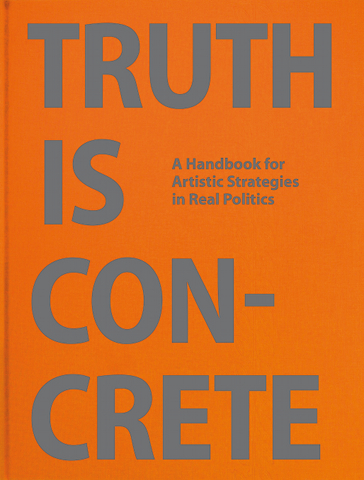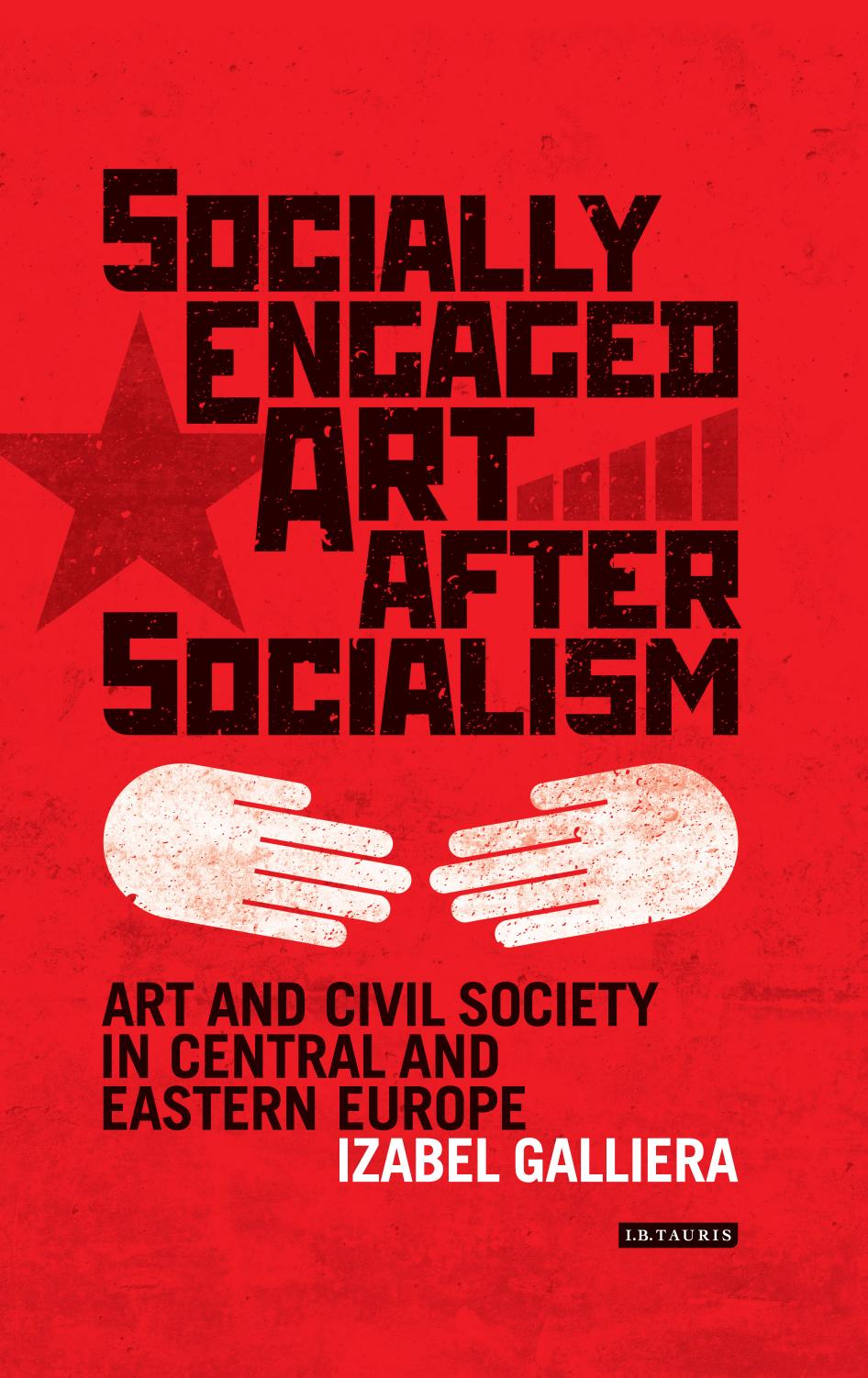Truth Is Concrete: A Handbook for Artistic Strategies in Real Politics (2014)
Filed under book | Tags: · activism, art, participation, participatory art, political art, politics, protest, social movements, tactics, useful art

“How does art play a role in social and political struggles all over the world? Can art be a tool with which to shape the world, rather than just reflect it?
Truth Is Concrete: A Handbook for Artistic Strategies in Real Politics takes the possibility of concrete truth as a working hypothesis and looks for direct action and concrete knowledge: for an art that not only represents and documents, but engages in specific political and social situations—and for an activism that not only acts for the sake of acting but searches for intelligent, creative means of self-empowerment. This book is the second manifestation under this title; the first materialized as a twenty-four-hour, seven-day marathon camp that took place in the frame of the steirischer herbst festival in Graz, Austria, in September 2012.
This handbook is a stand-alone publication, emphasizing the “usefulness” of the different artistic approaches collected. It is a toolbox and a manual with contributions by key protagonists in this field. One hundred texts describe very different strategies and tactics, written by their inventors and/or practitioners from all over the world, mapping the broad field of engaged art and artistic activism today. Additional essays focus on the philosophy, structures, and modalities behind the many battles to make this world a better place.”
Essays by Stephen Duncombe and Steve Lambert, Alanna Lockward, Florian Malzacher, Chantal Mouffe, Gerald Raunig, Jonas Staal; a conversation with etcetera, Nato Thompson, WHW; and drawings by Dan Perjovschi.
With further contributions by Jonathan Allen, Udi Aloni, Corina L. Apostol / Artleaks, Hector Aristizábal, Saki Bailey / Teatro Valle, Artúr van Balen / Tools for Action, Katherine Ball, Andy Bichlbaum / The Yes Men, Reverend Billy & The Church of Stop Shopping, Leah Borromeo, Andrew Boyd, Tania Bruguera, Santiago Cirugeda / Recetas Urbanas, Collective Authorship, Corrupt Tour, Gabriella Csoszó / FreeDoc, Minerva Cuevas, Neil Cummings, Diedrich Diederichsen, Charles Esche, Noah Fischer, Benjamin Foerster-Baldenius / raumlaborberlin, Sérgio Miguel Franco / Pixadores, Andrea Fraser, Isabelle Fremeaux, Christine Gaigg, Ganzeer, Federico Geller, Guillermo Gómez-Peña / La Pocha Nostra, Marina Gržinić, Núria Güell, Erdem Gündüz, Hans Haacke, The Haircut Before The Party, Stefano Harney, Carl Hegemann, Justin Hoffmann, Khaled Hourani, Iconoclasistas, The Institute for Human Activities, International Institute of Political Murder, Janez Janša, Khaled Jarrar, Jeudi Noir, Anna Jermolaeva, John Jordan, Janice Kerbel, Jisun Kim, Omer Krieger, the laboratory of insurrectionary imagination, Kalle Lasn / Adbusters, André Lepecki, Lexxus Légal, Lawrence Liang, Liberate Tate, Geert Lovink, Matteo Lucchetti, Lucifer / Church of Kopimism, Oliver Marchart, Leónidas Martín, Joana Mazza / Observatório de Favelas, Tomislav Medak, Thomas Meinecke, Jasmina Metwaly / Mosireen Collective, Antanas Mockus, Jean-Luc Moulène, Rabih Mroué, Michal Murin, Marina Naprushkina / Office for Anti-Propaganda, Neue Slowenische Kunst, Occuprint, Robyn Orlin, Ahmet Öğüt / The Silent University, Sibylle Peters, The Pinky Show, Srđa Popović / CANVAS, Public Movement, Raivo Puusemp, Richard Reynolds, Irit Rogoff, Ned Rossiter, Philipp Ruch / Center for Political Beauty, Yekaterina Samutsevich / Pussy Riot, Florian Schneider, Frank Apunkt Schneider / monochrom, Susan Schuppli / Forensic Architecture, Shared Inc., Inna Shevchenko / Femen, Gregory Sholette, Stevphen Shukaitis, Toma Sik, Kostis Stafylakis / Kavecs, Mladen Stilinović, Kuba Szreder, Claire Tancons, Mierle Laderman Ukeles, Ultra-red, the vacuum cleaner, Dmitry Vilensky / Chto Delat?, Marina Vishmidt, Joanna Warsza, WochenKlausur, Krzysztof Wodiczko, Jacob Wren, Stephen Wright, Kàddu Yaraax, Wu Yuren, Salam Yousry, and Slavoj Žižek.
Edited by steirischer herbst and Florian Malzacher
Co-edited by Anne Faucheret, Veronica Kaup-Hasler, Kira Kirsch, Andreas R. Peternell, Johanna Rainer
Publisher Sternberg Press, Berlin, and steirischer herbst, Graz, Apr 2014
ISBN 9783943365849, 3943365840
335 pages
via penfold
Project website (archived)
Publisher
WorldCat
PDF (67 MB)
Comment (0)Izabel Galliera: Socially Engaged Art After Socialism: Art and Civil Society in Central and Eastern Europe (2017)
Filed under book | Tags: · art history, bulgaria, civil society, communism, contemporary art, east-central europe, eastern europe, hungary, participation, politics, romania, southeastern europe

“Reclaiming public life from the ideologies of both communist regimes and neoliberalism, their projects have harnessed the politically subversive potential of social relations based on trust, reciprocity and solidarity. Drawing on archival material and exclusive interviews, in this book Izabel Galliera traces the development of socially engaged art from the early 1990s to the present in Bulgaria, Hungary and Romania. She demonstrates that, in the early 1990s, projects were primarily created for exhibitions organized and funded by the Soros Centers for Contemporary Art. In the early 2000s, prior to Bulgaria, Hungary and Romania entering into the European Union, EU institutions likewise funded socially-conscious public art in the region. Today, socially engaged art is characterised by the proliferation of independent and often self-funded artists’ initiatives in cities such as Sofia, Bucharest and Budapest.
Focusing on the relationships between art, social capital and civil society, Galliera employs sociological and political theories to reveal that, while social capital is generally considered a mechanism of exclusion in the West, in post-socialist contexts it has been leveraged by artists and curators as a vital means of communication and action.”
Publisher I.B. Tauris, London/New York, 2017
ISBN 9781784537135, 1784537136
xx+361 pages
Review: Denisa Tomkova (ARTMargins, 2018).
Comment (0)Jennifer Gabrys: Program Earth: Environmental Sensing Technology and the Making of a Computational Planet (2016)
Filed under book | Tags: · citizenship, city, climate crisis, computation, data, earth, ecology, environment, experience, individuation, participation, sensors, technology, urbanism

“Sensors are everywhere. Small, flexible, economical, and computationally powerful, they operate ubiquitously in environments. They compile massive amounts of data, including information about air, water, and climate. Never before has such a volume of environmental data been so broadly collected or so widely available.
Grappling with the consequences of wiring our world, Program Earth examines how sensor technologies are programming our environments. As Jennifer Gabrys points out, sensors do not merely record information about an environment. Rather, they generate new environments and environmental relations. At the same time, they give a voice to the entities they monitor: to animals, plants, people, and inanimate objects. This book looks at the ways in which sensors converge with environments to map ecological processes, to track the migration of animals, to check pollutants, to facilitate citizen participation, and to program infrastructure. Through discussing particular instances where sensors are deployed for environmental study and citizen engagement across three areas of environmental sensing, from wild sensing to pollution sensing and urban sensing, Program Earth asks how sensor technologies specifically contribute to new environmental conditions. What are the implications for wiring up environments? How do sensor applications not only program environments, but also program the sorts of citizens and collectives we might become?
Program Earth suggests that the sensor-based monitoring of Earth offers the prospect of making new environments not simply as an extension of the human but rather as new “technogeographies” that connect technology, nature, and people.”
Publisher University of Minnesota Press, 2016
Electronic Mediations series, 49
ISBN 9780816693122, 0816693129
x+357 pages
via publisher
Reviews: Etienne S. Benson (Am J Sociology, 2017), Matthew W. Wilson (Cultural Geographies, 2017).
Interviews: Rorotoko (2016), Ulrik Ekman (Computational Culture, 2017).
Author (with links to related articles)
Publisher
WorldCat
PDF (6 MB)
Comment (0)
